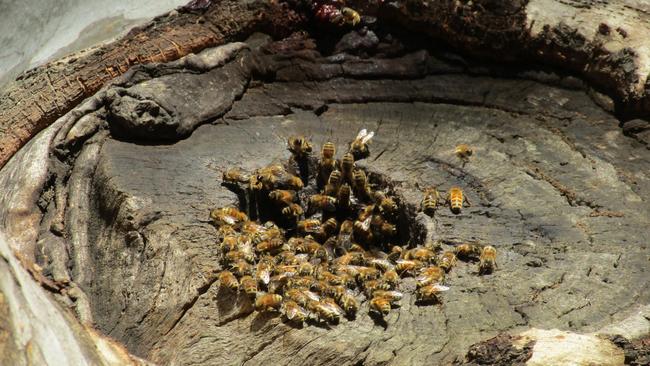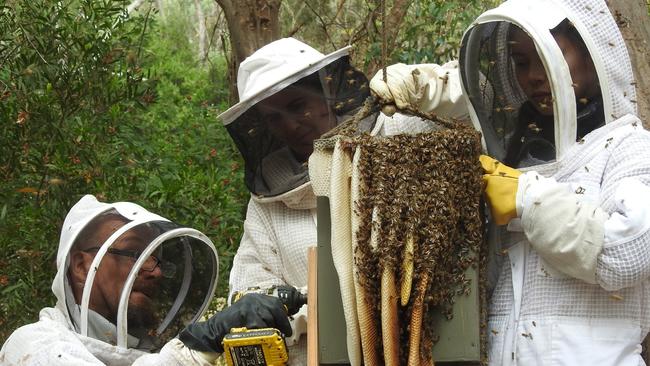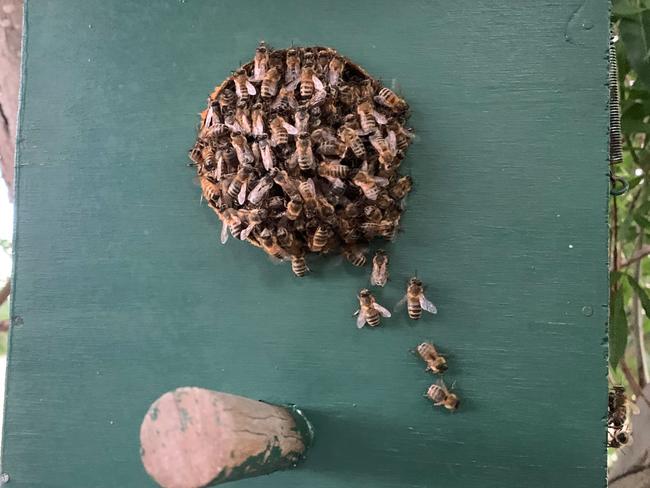Feral swarms of European honey bees are filling tree hollows in parks around Adelaide
Tree hollows in public parks around Adelaide are filled to overflowing with European honey bees – 50 hives were counted in just one park next to a primary school.
Pets and Wildlife
Don't miss out on the headlines from Pets and Wildlife. Followed categories will be added to My News.
European honey bees are at plague proportions in parks across Adelaide – with dozens of hives in tree hollows – endangering native wildlife and putting people with allergies at peril.
The Beekeepers Society of South Australia has admitted there is a problem and wants state government funding to catch more swarms before they settle in suburban parks.
Science graduate Heath Hunter, 33 of Enfield, raised concerns after counting 50 colonies in tree hollows at Pooraka Triangle Park – just 100m from Pooraka Primary School.
“I’ve seen similar and even higher densities throughout the greater Adelaide region,” he said. “I suspect that in many of these parks, the honey bees are at their maximum population densities, only limited by availability of pollen and nectar.”
It comes after the Sunday Mail last week reported Adelaide University expert Dr Katja Hogendoorn’s claim that the boom in backyard beekeeping – at least two hives per square kilometre and probably many more – was “selfish, harmful and dangerous”.
As well as robbing native animals and birds of food and shelter, poor keeping practices result in disease or bees running out of room, driving swarms out looking for new homes.
The Pooraka park is part of Salisbury Council, which said it was aware of the issue but would not remove colonies from hollows.

“If a colony of bees within a tree hollow is destroyed without removing the comb, there is a high chance of another colony re-establishing within the existing comb,” a spokeswoman said. “In many cases, removal of the comb would mean destruction of the tree, resulting in the loss of other environmental benefits.”
Instead, the council is trying to catch swarms before they settle and has installed bee boxes containing frames at various locations.
But concerned by a lack of action, Mr Hunter approached the government's Green Adelaide landscape management board. Chairman Chris Daniels said it would work with councils to manage bees so they did not settle in hollows.
He said Green Adelaide would also “encourage landholders and beekeepers to take responsibility” to avoid the takeover of the “homes and lives of native wildlife”.
Mr Hunter’s research prompted the Beekeepers Society of SA to fund a trial of swarm-catch boxes at sites with large bee populations across Adelaide.

The society is worried people will use insecticides to try and kill colonies in public spaces. Surviving bees would then contaminate commercial hives with the chemicals.
Society project officer Sandra Ullrich, who owns beekeeping business Adelaide Bee Sanctuary, said the catch-boxes were about “catching swarms on the fly”.

She did not know of a good solution for tree-hollow colonies.
Adelaide Honey Farms co-owner Xarchaeceya Waskowski said the Campbelltown, Salisbury and Tea Tree Gully council areas were among those “saturated” with bees and “we are working with (them) to mitigate issues”.
“I don’t think it’s OK for bees to rule and I’m very aware of the capacity for bees to harm others,” she said.
The Local Government Association said councils could order hive and swarm removals when warranted.





